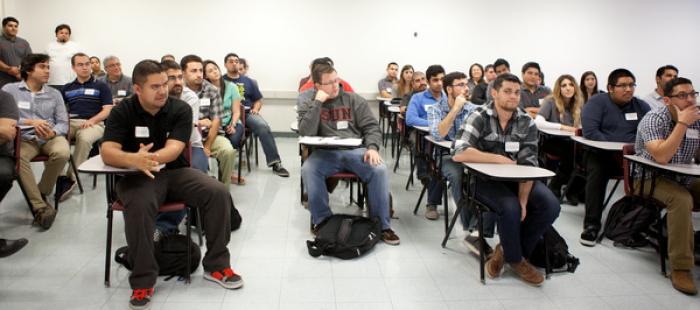Success, as the old saying goes, breeds success. And nowhere is that more evident than in the U.S. Department of Education HSI-STEM grant that the college was awarded last October. The grant builds on the achievements of the AIMS2 (Attract, Inspire, Mentor and Support Students) project, which was launched five years ago, also with HSI-STEM funding. That project, a partnership with Glendale Community College and College of the Canyons, was designed to increase the number of low-income, Hispanic and other underrepresented students graduating from CSUN with engineering and computer science majors. Through AIMS2, students in the program, from CSUN and the two community colleges, have gained access to special faculty mentoring and proactive advisement, tutoring and peer mentoring, social activities, field trips, career advising and hands-on summer research opportunities (see AIMS2 Research Symposium article, page 4) and are supported with stipends to motivate and inspire them to succeed. Since the inception of AIMS2, over 200 students have taken part, and the program has been nationally recognized by Excelencia in Education (2014), and as a Bright Spot in Hispanic Education (2015) by the White House Initiative for Educational Excellence for Hispanics for its success in retention and improved graduation of Hispanic and underrepresented students in engineering and computer science.
Unlike AIMS2, which has focused heavily on transfer students, [assert]the new grant will encompass services for freshmen and transfer students at multiple starting points, according to CECS dean S. K. Ramesh, the principal investigator on both grants.[/assert] Called Bridging the Gap: Enhancing AIMS2 for Student Success (AIMS2 2.0), the project, which awards the college nearly $6 million over five years, will serve students at CSUN and at five feeder community colleges that collectively account for 800 to 900 of the 1200 transfer students the college receives each year. These colleges include AIMS2 partners Glendale Community College and College of the Canyons, plus Pierce College, Moorpark College and L.A. Mission College.
AIMS2 2.0 activities will include faculty and peer mentoring; peer tutoring; lectures; customized workshops in mathematics and English; career workshops; workshops in “soft” skills, such as study skills, time management, acclimating to the university, study groups, financial aid awareness and managing one’s budget; summer and academic year research projects; and summer internships, among others. Every student who participates will also have a mentor from industry, and 50 students annually will receive $500 stipends for textbooks. A pilot introduction to calculus workshop will target students who have made it past developmental math, helping them understand where calculus is applied and improve their success rates.
“If we look at the freshmen population in the college’s majors, maybe 10% qualify for calculus directly,” Ramesh explains. “The rest are in developmental math. Our goal is to improve those figures and accelerate time to graduation.”
Beyond the programmatic aspects of the project, Ramesh would like to create a space on campus for the program to call home. “We’d like a place where faculty can drop in and AIMS2 students can go to have interactions that happen organically,” he says.
Twelve CSUN faculty members—seven from CECS, three from the Michael D. Eisner College of Education and two from the College of Science and Mathematics, will be working as a team on the various interventions, helping to assure the continued success of students at the university and the community colleges.
[assert] [/assert]
[/assert]
